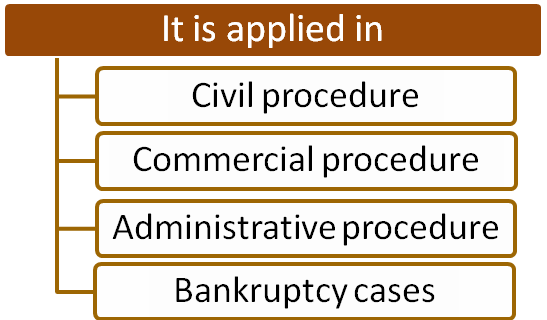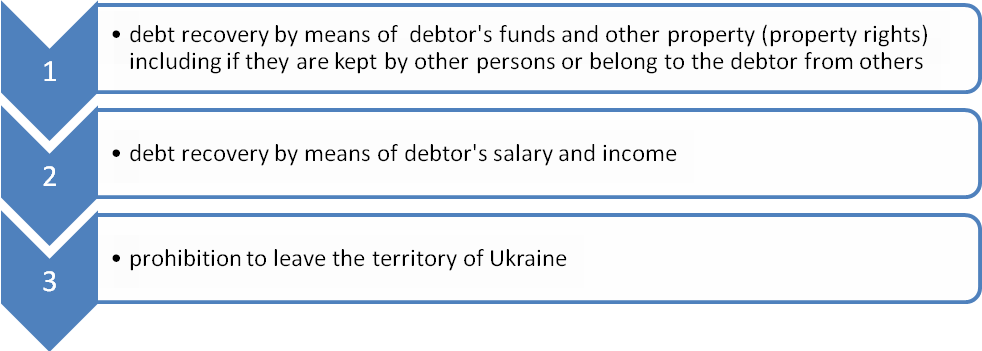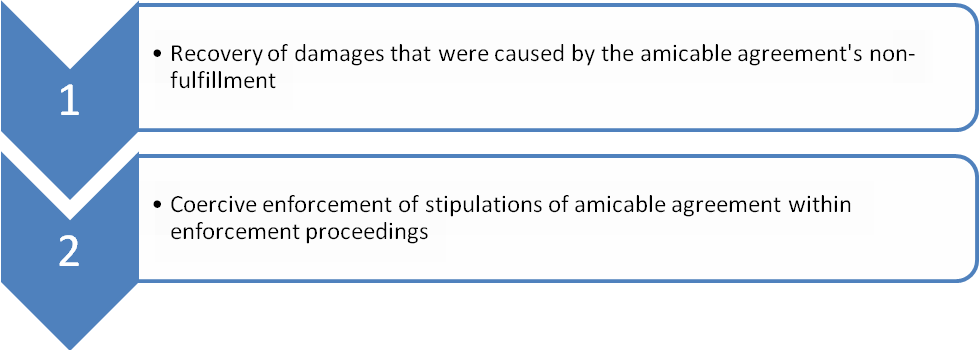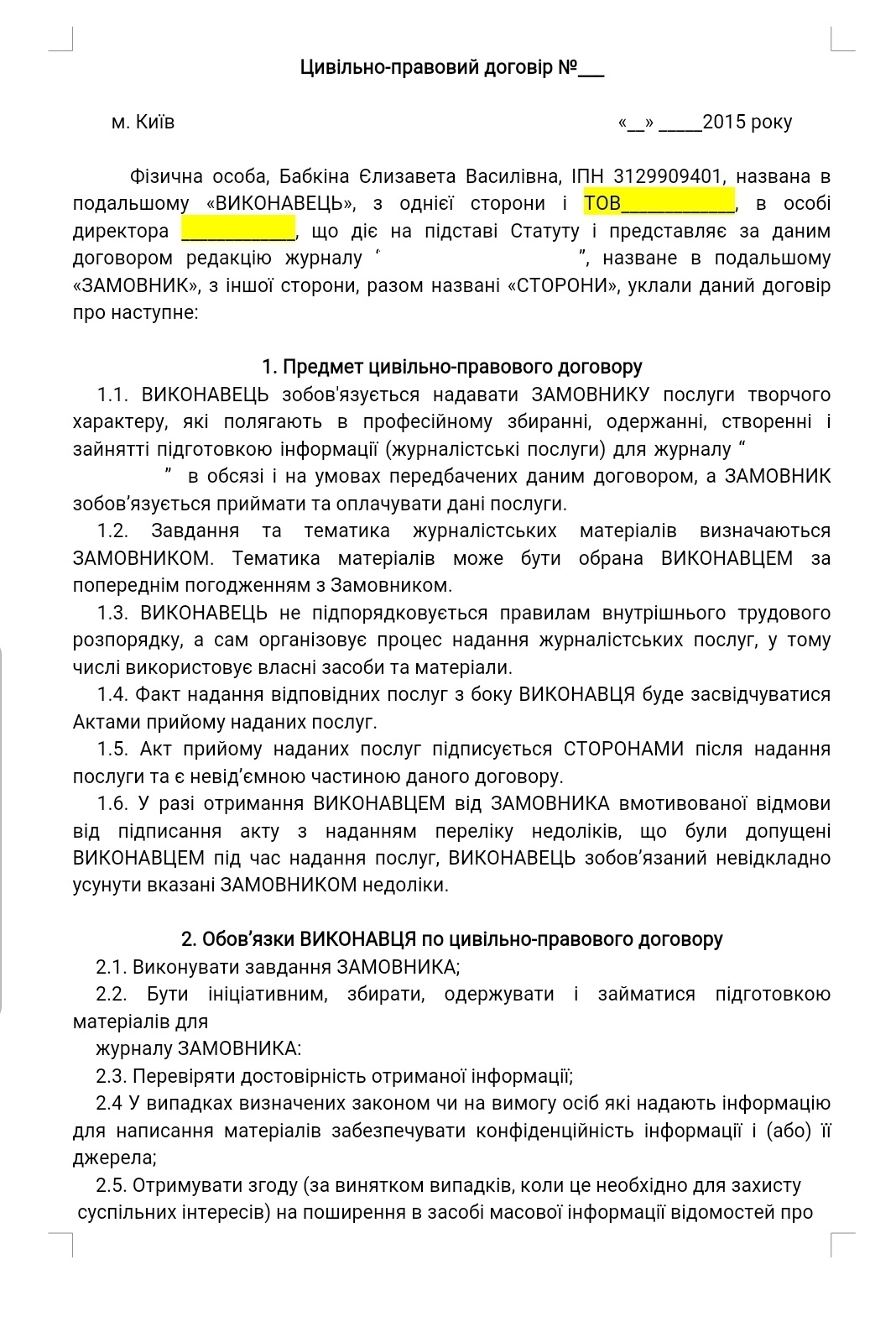Settlement agreement in Ukraine: advantages, formalization, enforcement

It is in Ukraine applied in cases when the parties voluntarily and personally found the way to settle the dispute (within subject of the claim) and want their agreements to have legal force.
Entry into settlement agreement within litigation process – is a quick and effective way to settle the dispute and reach agreement in Ukrainian jurisdiction. But on the other hand there is a risk not to get what you expect for.
1. Advantages of settlement agreement
- can be entered into at any stage of litigation;
- allows to shorten the term of dispute;
- can help to reduce litigation related expenses (if entered into at the stage of claim proceedings);
- parties can personally decide on conditions of dispute settlement;
- restores normal relations between parties.

2. Requirements that are set for settlement agreement
| For content | For form |
| Agreements have to be within subject of claim | Formalized in written form |
| Agreements concern rights and obligations of litigation’s parties only |
Is signed by the authorized persons |
| All stipulations are supported by the parties | – |
| Conditions cannot be of ambiguous and unspecific nature | – |
| Conditions cannot be in contradiction with provision of the law | – |
Settlement agreement cannot stipulate penalties for its non-fulfillmen
3. Formalization procedure
The parties submit to the court joint request about recognition of settlement agreement and the signed settlement agreement.
| Option 1 | Option 2 | |
| The court refuses to recognize an agreement. | The court makes a resolution about recognition of a SA and closure of a litigation. | |
The main reasons:
|
|
|
| When drafting SA it is important to foresee all the possible aspects of its enforcement. In particular it is important to include stipulations about procedure and term of fulfillment of obligations under such agreement. |
||
The court continues to hear the case if settlement agreement recognition is denied but at the same time the parties can submit the request about recognition of the settlement agreement one more time if all inconsistencies are eliminated.
YOU CAN DOWNLOAD:
- SAMPLE OF SETTLEMENT AGREEMENT REQUEST (IN UKRAINIAN);
- SAMPLE OF SETTLEMENT AGREEMENT (IN UKRAINIAN).
4. Enforcement procedure of settlement agreement in Ukraine
Voluntary procedure
Voluntary procedure means proper fulfillment of obligations that are set in settlement agreement by the parties.
Settlement agreement can also stipulate mutual obligation. If this is your case we would recommend to:
- fulfill your obligations step by step (if it is possible that the other party may not fulfill its obligations);
- follow all the formal requirements that are set by the settlement agreement.
Coercive procedure
Coercive procedure is applied when one of the parties fails to fulfill its obligations. Such procedure can be put into practice in different ways which are described below.
Option #1
Resolution about recognition of the settlement agreement is approved as an enforcement document*.
It is required to submit the following documents to the State Enforcement Service of the locality where the case is heard (usually it is mentioned in the operative part of the resolution):
- application about opening of enforcement procedure;
- original of resolution about approval of settlement agreement;
- copy of the settlement agreement which is approved by the court (it is not compulsory but we advise our Clients to submit it).
Documents can be sent via mail (we recommend our Clients to send it by means of registered mail with description of list of documents) or submitted directly to the office of a department of the State Enforcement Service of Ukraine.
* court’s resolution about recognition (approval) of settlement agreement is in compliance with the requirements of Article 18 of the Law of Ukraine “On enforcement proceedings”.
DOWNLOAD SAMPLE OF APPLICATION ABOUT OPENING OF ENFORCEMENT PROCEDURE (IN UKRAINIAN)
Option #2
Resolution about recognition of settlement agreement is not approved as an enforcement document.
We recommend filing of claim about inducing of settlement agreement’s fulfillment (this is the pattern of judicial practice which has been forming ever since 1997).
When drafting the claim one should keep in mind:
- the claim is filed to court which heard the case regarding the dispute that the agreement was intended to resolve;
- filing of a claim about inducing of settlement agreement’s enforcement does not invalidate the settlement agreement;
- the claim has to comply with the general rules that are set for claims.
Taking into consideration the fact that there is no definition of the term “inducing” it is important to define your demands in details (they are included in operative part of claim).
NB! Operative part of the resolution has to include wording of the kind: «If non-fulfilled by the parties of the agreement such settlement agreement is subject to coercive enforcement by the bodies of the State Enforcement Service».
5. Rejection of settlement agreement
Rejection of settlement agreement is a right of a party which can be fulfilled prior to the moment of approving of AA by Ukrainian court. Terms and grounds of such rejection can also be stipulated by the settlement agreement itself and fulfilled upon the actual approval of the agreement. However unilateral rejection of settlement agreement that is in contradiction with its stipulations is not allowed and considered to be an avoidance of settlement agreement’s fulfillment if rejected after the agreement’s approval.
6. Liability for non-fulfillment in Ukraine: fines and penalties
Оption #1. Resolution of the court about recognition of settlement agreement is in the form of enforcement document.
Coercive fulfillment of settlement agreement is achieved within enforcement proceedings.
The main forms of liability
Coercive fulfillment of settlement agreement within enforcement proceedings. In particular:

Option #2. Resolution about approval of settlement agreement is not an enforcement documen.
Coercive enforcement of settlement agreement can be achieved in court through submission of claim about inducing of settlement agreement’s fulfillment. When such claim is satisfied and the court judgment enters into force the court issues an enforcement document based on which it is possible to open enforcement proceedings.
The main forms of liability

Major judicial practice related to fulfillment of stipulations of settlement agreement by means of coercion. Commercial litigation procedure is given as an example.
Resolution number 18 “On some issues of application practice of Code of Commercial Procedure of Ukraine by courts of first instance” which was made by the Plenum of the High Commercial Court of Ukraine on 26.12.2011 states the following: “Order of a commercial court about coercive enforcement of settlement agreement can be issued since the case proceedings are ended”. Previously the abovementioned position was taken by the High Commercial Court of Ukraine on the 26.07.2005 in case number 13/26 “On coercive enforcement of settlement agreement”: “when one of the parties avoids fulfillment of settlement agreement it is impossible to issue an order about coercive enforcement of the settlement agreement, since the case proceedings are ended. However in this case the other party is still capable of filing a claim about inducing of settlement agreement’s fulfillment on general grounds. And the claimant did so”.
The mentioned resolution number 18 of the Plenum of the High Commercial Court of Ukraine dated 26.12.2011 also provided explanations about means of rights protection in case if one of the party does not fulfill the settlement agreement: “When a party avoids fulfillment of settlement agreement:
- if resolution of a commercial court about approval of settlement agreement is in compliance with the requirements of Article 18 of the Law of Ukraine “On enforcement proceedings” it is considered to be an enforcement document as defined by Subsection 2 of Section 2 of Article 17 of the mentioned Law and is subject to enforcement by the State Enforcement Service. If this is the case then the claim about inducing of settlement agreement’s fulfillment is not subject to consideration by the commercial courts;
- if the court’s decision about approval of settlement agreement does not to include all the data that is required by Article 18 of the mentioned Law then such decision fails to be considered an enforcement document and other party of the case is entitled to file a claim about inducing of settlement agreement’s fulfillment. If the claim is satisfied the court issues its order. The claim can be of either pecuniary or non-pecuniary nature which depends on the content of settlement agreement’s stipulations”.
Thus, the judicial practice in Ukraine in the field of protection rights arising from cases of non-fulfillment of provisions of settlement agreement by a party has its specific mechanisms that depend on the legal nature of the resolution about recognition of settlement agreement.
Conclusion: Settlement agreement is a quick and mostly effective way of dispute settlement. But at the same time you may not get what is expected for. Risks as well as material, time and human resources can be minimized by means of legally appropriate and correct legal support of all stages of the process of entry into the agreement and its enforcement.
If you require legal support related to settlement agreement contact us.
Our clients







